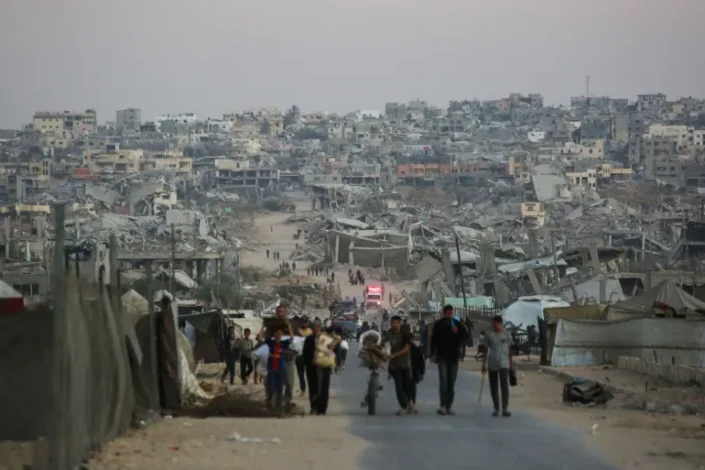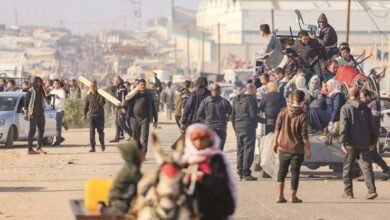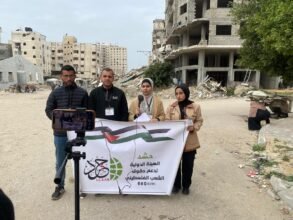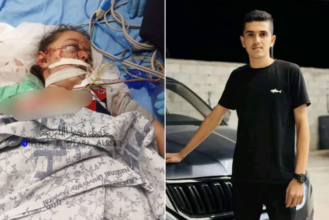
ICSPR: The Israeli Occupation Continues to Breach the Ceasefire and Uses Starvation and Genocide Policies Against Civilians in the Gaza Strip
Date: October 29, 2025
Press Release
ICSPR: The Israeli Occupation Continues to Breach the Ceasefire and Uses Starvation and Genocide Policies Against Civilians in the Gaza Strip
The International Commission to Support Palestinian Rights (ICSPR) strongly condemns the grave crimes and violations committed by the Israeli occupation forces against civilians in the Gaza Strip, despite the declared ceasefire agreement that came into effect on October 10. The occupation has continued its systematic breaches through the intense bombing of residential areas and shelters, the prevention of humanitarian aid entry, and the imposition of a comprehensive blockade that uses starvation as a weapon of war and genocide against the civilian population.
The governorates of the Gaza Strip witnessed yet another bloody night, leaving more than 100 martyrs, including women and children, in addition to dozens of wounded and missing persons, as a result of airstrikes targeting civilian homes, tents of displaced persons, and crowded areas in Nuseirat, Deir al-Balah, Beit Lahia, Khan Yunis, and Gaza City.
In Nuseirat, the Abu Dalal family was completely wiped out, while tents of displaced persons near Al-Aqsa Martyrs Hospital in Deir al-Balah were targeted, resulting in the martyrdom of Islam Al-Batreeqi and five members of the Roubi family. Israeli warplanes also targeted residential apartments in Tel Al-Hawa and Al-Shati Camp, as well as tents of displaced persons in Al-Mawasi, Khan Yunis.
According to the Ministry of Health, the bodies of 100 martyrs arrived at Gaza hospitals during the night alone, distributed as follows:
-
27 martyrs at Al-Shifa Hospital
-
10 martyrs at Al-Ahli (Baptist) Hospital
-
31 martyrs at Al-Awda Hospital
-
12 martyrs at Al-Aqsa Hospital
-
20 martyrs at Nasser Hospital
The Ministry also confirmed the death of 983 patients who had been waiting for permits to receive treatment outside the Strip, due to the ongoing medical blockade and the prevention of patient transfers, amid a complete collapse of medical and pharmaceutical capabilities.
ICSPR emphasizes that the Israeli occupation is using collective starvation as a systematic weapon of war by deliberately controlling the entry of food, fuel, and medicine into the Strip.
According to data monitored by the Commission between October 10 and 26, 2025, only 8,207 trucks entered Gaza—an average of 512 trucks per day—of which only 28% were humanitarian aid, while 72% were commercial shipments, in a deliberate attempt to mislead public opinion and create a false impression of humanitarian openness.
Meanwhile, 6,000 aid trucks belonging to the UN and UNRWA remain stranded at the crossings, as the occupation continues to block the entry of fuel, generators, humanitarian personnel, and international journalists.
Despite Israel’s announcement that it would allow 50 fuel trucks per day, the total amount that actually entered since the ceasefire began has not exceeded 800 trucks, representing less than 10% of the minimum requirement needed to operate vital facilities.
The occupation also deliberately allows the entry of luxury goods such as cigarettes and soft drinks while restricting food and medicine, leading to unprecedented price hikes—where a 25 kg bag of flour now exceeds 100 shekels. Over 95% of Gaza’s population is now unable to meet their basic needs amid total income loss and soaring poverty and unemployment rates reaching catastrophic levels.
ICSPR affirms that Israel’s current practices and crimes constitute a blatant violation of Articles (55) and (147) of the Fourth Geneva Convention (1949) and amount to a war crime under Article (8/2/b/25) of the Rome Statute of the International Criminal Court. These acts also amount to slow-motion genocide, intended to destroy the civilian population in whole or in part through siege, starvation, and deprivation of essential life resources.
Furthermore, the targeting of residential areas, hospitals, shelters, and tents of displaced persons constitutes a flagrant breach of the ceasefire agreement and a violation of the principles of proportionality, distinction, and humanity, which are the cornerstones of international humanitarian law.
ICSPR warns that the continuation of airstrikes, siege, and prevention of aid delivery will lead to a total humanitarian explosion and the complete collapse of the health and social systems in the Gaza Strip. It stresses that what is happening constitutes a continuation of the systematic genocide being committed before the eyes of the world, and that the silence and inaction of the international community have gone beyond political failure to direct complicity in the crime.
Accordingly, ICSPR calls for:
-
An urgent international condemnation of Israel’s aggression and its blatant breach of the ceasefire agreement, urging mediators to act immediately to stabilize the ceasefire, prevent further violations, and ensure the opening of crossings and the entry of humanitarian aid and all essential needs of Gaza’s residents.
-
The convening of an emergency session of the UN Security Council or a meeting of the UN General Assembly under the “Uniting for Peace” framework to address Israeli crimes and violations and to establish an urgent international protection mechanism for civilians, in the context of ending the occupation.
-
The International Criminal Court to open an immediate investigation into crimes of genocide and the use of starvation as a method of warfare.
-
Pressure on the occupation to immediately allow the entry of equipment, tents, fuel, medical devices, and field hospitals without restrictions.
-
Activation of universal jurisdiction by States Parties to the Geneva Conventions to prosecute Israeli leaders as war criminals.
-
Strengthening the role of UNRWA and international organizations, enabling them to operate freely in delivering aid, and stopping any obstruction to their work.
-
Calling on the Palestinian Authority and factions to unify efforts and agree on managing the transitional phase through the formation of a national administration to oversee relief, reconstruction, and civilian protection efforts.





